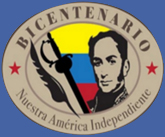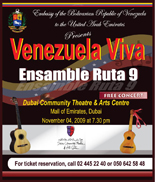
Bolivarian Republic of Venezuela
Embassy in the UAE
A Brief HistoryThe process by which Venezuela came into being as a nation can be divided into three stages: discovery, conquest and settlement. The shores of Venezuela were discovered by Christopher Columbus on his third voyage to the New World in 1498. It was his first sighting of the American mainland and such were its natural beauties that he named the new territories the "Land of Grace". His reports of bounties induced the exploration of the Caribbean coast as far as Lake Maracaibo. It was the Italian geographer and navigator, Americo Vespucci, (whose name also came to identify the New World) who named the area "Little Venice", or Venezuela, because of the resemblance of the native stilt houses found on the shores of Lake Maracaibo to the Venetian dwellings of the time. The 16th Century was a time of exploration and discovery throughout the South American continent. Nueva Cadiz, on the Island of Cubagua, founded in 1516 and later destroyed by an earthquake, was the first city in South America. Soon afterwards the cities of Coro, on the west, and Cumana, on the east, were founded on the mainland. From there, expeditions for the discovery of the territory were conducted under the guidance of the Spanish Crown. A unique feature in this process was introduced when in 1528 Carlos I of Spain, who was also the Holy Roman Emperor, gave the German banking house of Weiser the right to conquer and settle in the western part of Venezuela. The German mandate, largely ineffective, was terminated in 1546. A more stable and continuous process of settlement began in 1556. This period saw the birth of most of Venezuela's cities. Caracas was founded by Diego de Losada in 1567. Venezuela's present patterns of settlement were shaped during the process of colonization that characterized the 17th Century. During the 18th Century Venezuela underwent a process of administrative consolidation. It was in 1777 that the provinces of Venezuela, Nueva Andalucia, Merida, Maracaibo and Guayana were unified in what became known as the Captaincy-General of Venezuela. By 1786 Caracas became the administrative center of the province and of the ecclesiastical, judicial, military and educational institutions. The province was governed by a representative of the Crown although it benefited from a significant degree of autonomy at the municipal level. During the over three centuries of Spanish rule Venezuela never attained the very significant economic and political importance of the major vice-royalties upon which Spain relied for the administration of its American provinces. Its mineral riches had not yet been discovered and its agricultural conditions and climate were less attractive than those of other colonized lands. Venezuela's population remained small, with an economy based mainly on a few agricultural crops, extensive cattle raising and a re latively small share of colonial trade. By the late 18th century, the strong ideological influence of the European "Enlightenment" and of the American and French Revolutions, combined with widespread discontent with the Spanish economic and political regime, gave rise to the independence movement. Indeed, Venezuela was one of the first provinces in the New World to declare itself independent. Napoleon's invasion of Spain and Ferdinand VII's subsequent abdication to the crown precipitated the events. In 1810 Venezuela formally declared its independence from Spain and in 1811 adopted a republican constitution. However, it was not until 1821, under the leadership of Simón Bolívar, that full independence was achieved following the struggle of the War of Independence. During this period Venezuela also contributed in a major way to the independence of neighboring countries. The wars caused Venezuela to lose nearly one third of its population. Shared values and interests, strengthened during the war, allowed for the creation of the Gran Colombia, which between 1820 and 1830 united in a federation the present-day nations of Ecuador, Colombia, Panama and Venezuela. This union was dissolved in 1830 as a result of a complex process of internal and regional political develo pments. Venezuela then became an independent republic and its first president was Jose Antonio Paez. The remainder of the 19th Century and the early part of the 20th Century were an era of political unrest and strife, characterized by continuous struggles between the local and central government, among regions and political factions. The Federal War, (1859-1863), was the most devastating of this series of internal struggles. The Constitution of 1864 established a federal system with provincial autonomy and gave the Republic the name of the United States of Venezuela. The reforms did not, however, guarantee by themselves the desired political stability. Its absence allowed for further deterioration of the economic and social climate, and gave way to a series of repressive administrations, among which that of Juan Vicente Gomez (1908-1935) is to be noted. During his rule the country was unified under a central government and the economy was open to industrialization. The most dramatic and influential change in this regard, as it later became the basis for Venezuela's modern economy, was the emergence and development of the oil industry. The earliest oil concessions were granted in the 1910's with the first substantial quantities of oil being exported in the early 1920's. Venezuela's transition to a modern democracy was long and difficult. It was not until 1947 that the first direct popular election of a Venezuelan president, Romulo Gallegos, a renowned novelist and candidate of the Democratic Action Party (Accion Democratica), took place, thereby leaving behind for good the system of indirect elections that had prevailed since the beginning of the Republic. The Gallegos government, however, was shortlived. In November 1948, only nine months after he had taken office, a military coup overthrew Gallegos in what, again, can be characterized as a strong resistance by certain sectors of the Venezuelan society of the time to the imperatives of political modernization. A period of repressive military rule followed until 1958, when a widespread popular revolt reinstated democracy. The overthrow of the Perez Jimenez dictatorship and the popular election of Romulo Betancourt as President turned a new leaf in Venezuela's history and politics, ushering a period of democratic rule which continues to this day. |








